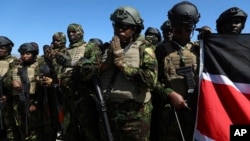Two hundred Kenyan police officers arrived in Haiti on Thursday to join the United Nations-backed mission to fight gangs in the crisis-plagued Caribbean country.
More than 600 Kenyan officers had already been stationed in Haiti as part of a multinational force of police officers and soldiers from other countries — including Jamaica, Guatemala and El Salvador — who assist Haiti’s police in fighting the violent gangs in control of much of the capital, Port-au-Prince.
"The Haitian National Police are outnumbered and outgunned by the gangs," William O'Neill, a U.N. expert on Haiti, told The Associated Press on Thursday.
The U.N. mission plays a critical role in establishing security in Haiti, he said.
The arrival of the newly deployed police officers from Kenya was cast into doubt earlier this week, when U.S. President Donald Trump announced a freeze on U.S. foreign aid that included $13.3 million slated for the U.N. mission in Haiti.
The U.S. State Department, however, announced it has approved waivers for $40.7 million in foreign aid for the Haitian mission and the police. The State Department also said it recently delivered "much-needed heavy armored equipment" to the mission and the police.
Godfrey Otunge, the U.N.’s mission's force commander in Haiti, said in a statement Wednesday that the frozen funds make up under 3% of ongoing assistance to the mission. Both the state and the defense departments "remain actively engaged" in the mission, Otunge said.
"I want to assure everyone, especially the people of Haiti, that the mission remains on track," the force commander said.
According to Otunge, the U.S. and other partner countries are continuing to contribute logistical, financial, and equipment support to the Haitian mission.
"Steady and predictable funding for the [mission] requires all states to contribute, especially those in the region," O'Neill, the U.N. expert on Haiti, said. "More stability in Haiti will reduce the pressure to migrate, which is in everyone's interest."
The Kenyan-led U.N. mission faces a daunting task in a country that has never fully recovered from a devastating earthquake in 2010 and is now without a president or parliament. Haiti is ruled by a transitional body that faces enormous challenges, including gangs and extreme violence and poverty. Almost 6,000 people were killed in gang violence in the country last year.
U.S. Secretary of State Marco Rubio spoke with Kenyan President William Ruto Thursday and thanked him for the country’s leadership of the mission in Haiti.
Last year, nearly 1 million people in Haiti fled their homes due to gang violence, a figure that French news agency Agence France-Presse reports as three times higher than the previous year.
Some information for this story came from The Associated Press and Agence France Presse.





